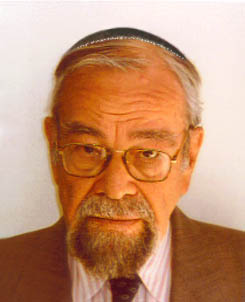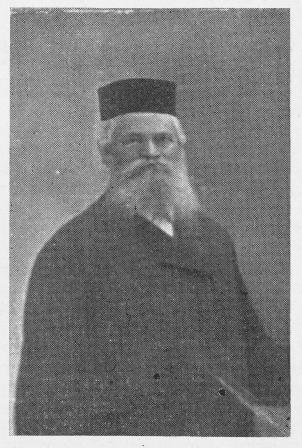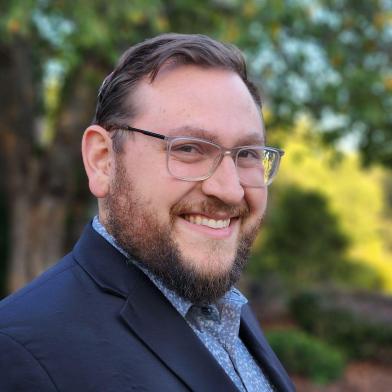Mordechai Breuer was born in the city of Frankfurt am Main on April, 1918. He was the second son of Dr. Yitzhak Breuer and Esther Jenny, born Eizman. Mordechai was born and raised in the house of his grandfather 'Beit Harav', Rabbi Shlomo Breuer, the community’s rabbi, and the father-in-law of Rabbi Shimshon Rafael Hirsch who formed, shaped, and led the community.
Mordechai received from his father a strong affection for Israel in general and for Jerusalem in particular. In 1936 the family immigrated to Israel. Breuer initially studied with his brother Yaakov in Jerusalem, at the Haredi Rabbi Dushinsky’s yeshiva for a short time before moving to the Hevron yeshiva where he would study for two years, until 1938. He would go on to teach English at the Horev school, an institution founded by Haredi immigrants from Germany.
In 1942, Breuer studied in a course for music teachers at the Jerusalem Conservatory and received a teaching certificate. At the same time, he studied pedagogical lessons at the Hebrew University. In the same year, he married Simcha, the daughter of Dr. Yaakov Levy, who immigrated to Jerusalem from Berlin. From that year until the War of Independence he studied external studies at the University of London but did not complete his BA. degree due to the British leaving the country and the War of Independence. Because his father, who died in 1946, was the leader of Agudat Israel, his sons refrained from enlisting at the Hebrew University, which was affiliated with the secular Zionist enterprise.
From the early 1950s, Breuer would lead the Kfar Eliyahu institution of the Aliyat Hanoar near Gadera for about seven years. There, he led prayers in a style that combined the various communities of the institution's children.
Breuer began his studies at the Hebrew University at the end of the 1950s, with his mother’s approval and graduated with a BA. and MA. In 1966 he received a doctorate in the history of Israel. For about ten years he taught and managed all of the Horev institutions in Jerusalem and was one of the founders of the high school yeshiva there. In 1970, he stopped teaching in schools and moved to Bar-Ilan University to teach in the Department of Israeli History until his retirement in 1986. His areas of research were mainly the history of Orthodox Judaism in Germany (Neo-Orthodoxy), and the world of yeshivot and their development.
Mordechai Breuer's Musical Education:
In the synagogue of the Kahal Adat Yisrael congregation in Frankfurt am Main, poetry and cantorship occupied a significant place. As a musical child, Mordechai learned a lot there. There was a regular choir in the synagogue and the conductor, Max Neumann, who was also a music teacher at the school, took children he knew to the synagogue choir. At the age of 11, Breuer was accepted to sing in the synagogue choir as a soprano. The choir members had arranged rehearsals and classes. The chief cantor was Peshowitz and he affectionately called Mordechai, then still a young boy, 'my friend and colleague'. For him, he was the most musical of the choir’s children. Breuer learned to play the piano for several years, until turning thirteen. His home and the synagogue gave him a significant, though informal, musical education. At the Breuer family home, the hymns occupied a central place on Saturdays and holidays.
In Israel, Breuer taught the history of Jewish music at the conservatory. In the 1950s, he taught at Kastenberg and Amiran music teachers' seminars in Tel Aviv. Until 1943 he thought about a career as a composer. He would say that he realized that although being very fond of music (he had already written and composed works), it is not enough to make a career out of it. Studying at the conservatory ostensibly completed this longing for an orderly pursuit of music. For many years he served as a cantor at the Horev Synagogue in Rehavia in Jerusalem.
Over the years, Mordechai Breuer composed many liturgical and para-liturgical works for a variety of events. As an educator for many years, and as a musician, he saw music as a major tool in youth education.
In the years 2003-2004, Mordechai Breuer met with Oded Peles and recorded the entire repertoire of the Frankfurt am Main community, according to its 'musical calendar', including liturgical and para-liturgical music, customs, and traditions, as were customary in the community and in Prof. Breuer's family. The recording was made systematically according to topics in the Jewish calendar as follows: introduction and personal biography; Musical tradition in the Frankfurt am Main community; Shabbat; Zemirot; Torah reading; Daily prayers; Hagim; Passover Haggadah; Hanukkah; Purim; Fasting and Selichot; the month of Elul; the month of Tishrei. These recordings are available online at the National Library of Israel website.
Source:
Oded Peles, summary and review of studio recordings in the national phonetics of Prof. Mordechai Breuer on the subject: The tradition of the Frankfurt am Main community, Germany, (Seminar work for MA. whithin a personal guidance by Prof. Edwin Seroussi, 2015) (Hebrew).
In Hebrew: עודד פלס, סיכום וסקירת הקלטות אולפן בפונותיקה הלאומית של פרופ' מרדכי ברויאר בנושא: המסורת והנוסח של קהילת פרנקפורט ע'נ מיין, גרמניה, (עבודה סמינריונית למוסמך במסגרת הדרכה אישית של פרופ' אדווין סרוסי, 2015)
More Sources:
See on Zemereshet website one of the songs that Breuer composed: 'Keroe edro ire' (Hebrew: 'כרועה עדרו ירעה')
His manuscripts and musical works of Prof. Mordechai Breuer have been transferred to the Music Department of the National Library of Israel, see here.






